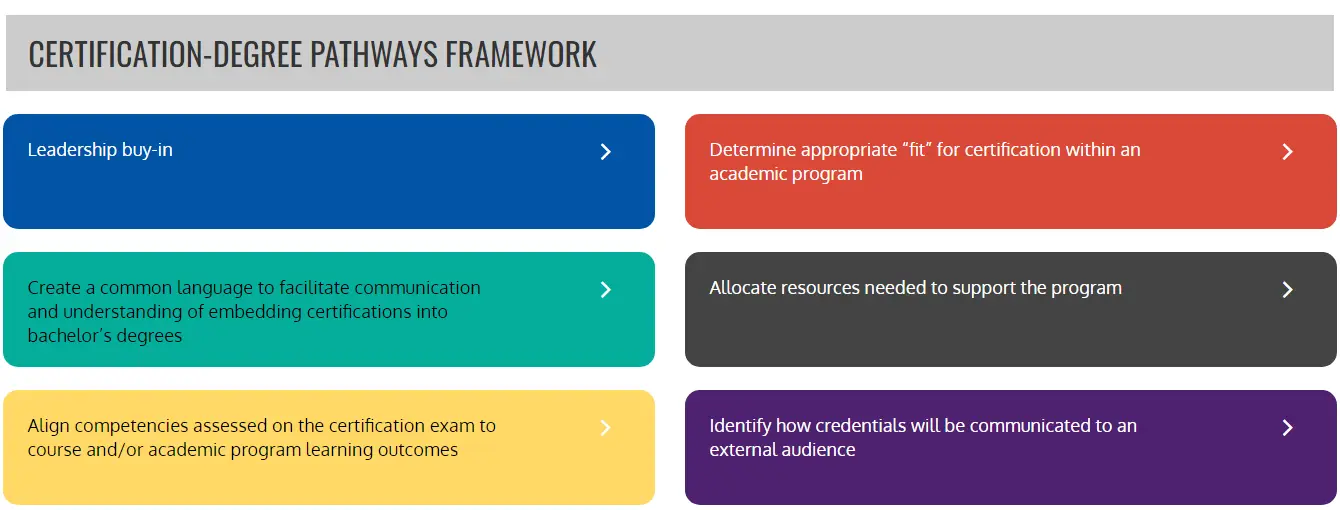Credentialing pathways provide opportunities for colleges and universities to align their academic curricula with industry skill needs by embedding or aligning non-degree credentials (e.g., certificates, certifications, microcredentials) with degree programs.
These pathways provide opportunities for learners to master occupationally relevant-skills that lead to living wage jobs while continuing to earn a degree.
For example, by aligning their curricula with competencies in certification exam blueprints, colleges and universities can ensure that the curricula are up-to-date and meet the skill needs defined by employers. And these pathways offer students the analytical skills they need to be lifelong learners (degree) as well as the technical skills they need to contribute as professionals (certification).
These pathways have the potential to benefit all learners because it is a broadly applicable, scalable approach that can be used to align degrees in any academic discipline with industry-relevant competencies.
Aligning Credential Pathways, Institutional Policies, and Labor Market Needs
Under a grant from Greater Texas Foundation, Workcred partnered with Houston City College and Texas Southmost College to better align their credential pathways, which integrate industry credentials with regional labor
market needs and better support low-income and first-generation learners to complete these pathways, earn postsecondary and industry credentials of value, and enter the workforce.
In addition, Workcred and Houston City College teamed up again under a grant from Powell Foundation to examine how state and institutional policies can be better aligned to support learners in entering and completing credentialing pathways aligned with regional workforce needs.
These two projects uncovered several ways community colleges can improve alignment of pathways and policies to
better support learners to achieve the skills they need to enter the workforce and obtain jobs with family-sustaining wages.
Creating Certification + Degree Pathways at Community Colleges
With support from ECMC Foundation, Workcred, the League for Innovation in the Community College, and the Higher Learning Commission partnered with four community colleges to develop and implement certification + degree pathways in information technology (IT)
and health science programs and establish a process for low-cost replication.
Workcred and its partners have developed several resources to demonstrate how community colleges can successfully prepare students for living-wage careers through pathways that integrate associate degrees and industry certifications.
Incorporating Microcredentials into Bachelor’s Degree Programs
Workcred has conducted several workshops for faculty and administrators at The University of Texas System (UT System) institutions focused on how microcredentials could be incorporated with bachelor’s degrees to ensure that graduates are broadly educated (degree) and specifically skilled (microcredential), potentially increasing graduates’ employment opportunities and earnings outcomes.
This work resulted in a framework report that provides an overview of microcredentials; factors to consider when building or selecting a microcredential; promising microcredential practices in digital skills and data analytics; approaches to align data analytics microcredentials with undergraduate experiences; a guide for the development and implementation of microcredentials; and assets to support microcredentialing efforts in the UT System.
This framework can be used to align microcredentials in any subject area with bachelor’s degrees.
The UT System continues to create opportunities for students to earn short-term credentials (i.e., professional certificates and microcredentials) through the Texas Credentials for the Future Initiative. Some faculty adopted existing professional certificates, while others developed their own microcredential.
To highlight these efforts, Workcred created four case studies to provide examples of the multiple approaches for integrating microcredentials with an undergraduate program. Three of the case studies showcase how faculty in the humanities, behavioral and brain sciences,
and cybersecurity utilized microcredentials in their undergraduate courses. The other case study explores an asynchronous, co-curricular experience that allows students to gain technical skills and
strengthen 21st-century power skills (e.g., communication, critical thinking, teamwork).
Identifying the Opportunities and Challenges of Integrating Certifications into Bachelor’s Degrees
As a basis for all this work described above, Workcred originally joined forces with the Association of Public and Land-grant Universities, the Coalition of Urban Serving Universities, and UPCEA to identify the opportunities, challenges,
and practical examples associated with integrating high-quality, industry certifications into bachelor’s degree programs. Under a grant from Lumina Foundation, the goal of the collaboration was to create more opportunities for students to earn multiple credentials with labor-market value.
The project culminated with the development of the framework below to develop and scale certification-degree pathways. Learn more about the elements of the framework.

Connect with Us
Each of these projects continues to expand the knowledge about the value of credential pathways for leaners, faculty, administrators, and employers. Contact Workcred if you are interested in developing or expanding credentialing pathways.
